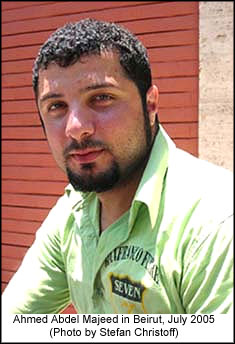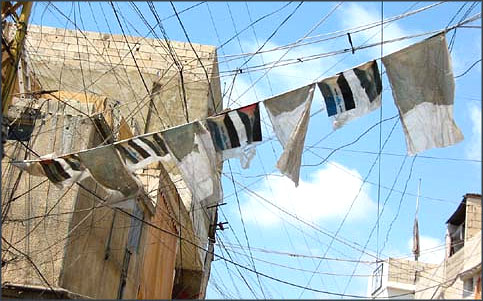Deportation, Destitution and Dignity
Stefan Christoff
In November 2003 Ahmed Abdel Majeed, a stateless Palestinian born and raised in Ein el-Hilweh refugee camp in southern Lebanon, was deported from Canada. The distance between Montreal and Lebanon stretches thousands of kilometers over oceans and continents, but is only a short distance in Ahmed’s eyes and living memory of an existence shaped by the daily struggle of statelessness.
 Today Ahmed resides in Ein el-Hilweh, with an estimated 80 000 other stateless Palestinians in the country’s largest refugee camp located on the outskirts of the southern Lebanese city of Saida. Ein el-Hilweh is a stark example of the lived reality of persecution that Palestinian refugees face today in Lebanon.
Today Ahmed resides in Ein el-Hilweh, with an estimated 80 000 other stateless Palestinians in the country’s largest refugee camp located on the outskirts of the southern Lebanese city of Saida. Ein el-Hilweh is a stark example of the lived reality of persecution that Palestinian refugees face today in Lebanon.
Ein el-Hilweh is a Palestinian ghetto, a social and economic prison for tens of thousands of refugees displaced by the creation of the state of Israel. The entire camp and its thousands of residents are restricted to approximately 2 square kilometers and completely surrounded by Lebanese military check-points, which deny Palestinians freedom of movement. To enter or exit the camp Palestinians are forced to show their U.N. issued refugee identity documents to Lebanese soldiers, enforcing a physical and physiological control over Palestinian movement.
Military control over Palestinians in Ein el-Hilweh symbolizes broader social and economic oppression, enforced by laws and regulations of the Lebanese state, which undermines the basic survival of Palestinians. Forbidden from owning property, working in over 70 professions and legally defined as foreigners, Palestinians live in Lebanon as second-class citizens without any basic social or political rights.
In 2003 Amnesty International conducted a report on the condition of Palestinian Refugees in Lebanon, which concluded that, “discrimination levied against Palestinians in relation to the rights to own and inherit property and the right to work, creates conditions where Palestinians refugees cannot enjoy an adequate standard of living.” The report noted that in Ein el-Hilweh, “unemployment reaches 80% among Palestinian professionals”.
In June 2005 Lebanon’s outgoing Labor Minister Tarrad Hamadeh proposed an amendment the country’s labor law, which would allow Palestinians to obtain foreign work permits for employment in “manual and clerical” jobs. However due to ongoing governmental instability in Lebanon, no concrete changes have been implemented. Even with proposed changes Palestinians still would be barred from working as professionals in the fields of medicine, engineering and law. Even with the proposed changes institutionalized discrimination against Palestinians would continue.
In this political context, Palestinians in the camps of Lebanon could define the term refugee: they are born stateless in a country that practices active forms of discrimination, rooted in a political objective to attack Palestinian survival.
From Ein el-Hilweh to Montreal
In the face of political persecution against Palestinians, Ahmed Abdel Majeed fled Ein el-Hilweh camp in 2001 and joined hundreds of other Palestinian refugees from Lebanon in Canada. With ideals of Canada as a nation defined by respect for human rights, Ahmed applied for refugee status from Citizenship and Immigration Canada.
 In a recent interview conducted in Beirut, Ahmed spoke on his experience of deportation from Canada and his decision to flee Ein el-Hilweh in 2001. Ahmed reflected on the difficulty of the decision to leave his history, family and life, “When I thought of leaving to Canada I had a terrible feeling, all my childhood was in Lebanon, my family was in Ein el-Hilweh, all that I knew was in Lebanon, so I was frightened to leave. However in Lebanon as a Palestinian I have no civil and social rights, so I was forced to leave the camp, to support my family.”
In a recent interview conducted in Beirut, Ahmed spoke on his experience of deportation from Canada and his decision to flee Ein el-Hilweh in 2001. Ahmed reflected on the difficulty of the decision to leave his history, family and life, “When I thought of leaving to Canada I had a terrible feeling, all my childhood was in Lebanon, my family was in Ein el-Hilweh, all that I knew was in Lebanon, so I was frightened to leave. However in Lebanon as a Palestinian I have no civil and social rights, so I was forced to leave the camp, to support my family.”
Ahmed´s life in Ein el-Hilweh exemplifies traditional definitions of a political refugee. However after applying for asylum, Ahmed was faced with political persecution as a Palestinian in Canada.
In the shadow of the September 11th attacks in New York City and the ensuing backlash in North America and throughout the world against Arabs and Muslims, Ahmed’s claim for refugee status in Canada was rejected. His ideals of Canada as a nation founded on humanitarian values, projected in propaganda throughout the world, were crushed by Immigration Canada’s racist decision in denying Ahmed asylum.
In 2001, Palestinian refugees in Canada like Ahmed came under fire from the Canadian government in the context of growing institutional attacks against immigrants and refugees. As in Canada’s foreign policies, which inherently attack Palestinians through political support for Israel’s ongoing occupation of Palestine, Immigration Canada’s rejection of Ahmed’s asylum claim undermined the history of persecution and oppression, which Palestinians have experienced throughout the Middle East for over 50 years.
The decision to refuse Ahmed asylum claim contradicted Canada’s own immigration and refugee laws. According to Canada’s “Immigration and Refugee Protection Act”, Ahmed perfectly defines a “refugee” as one who has “a well-founded fear of persecution for reasons of race, religion, nationality, membership in a particular social group or political opinion”. Further “a refugee” is defined by the Canadian government as a person “who does not have a country of nationality, is outside their country of former habitual residence and is unable or by reason of that fear, unwilling to return to that country.”
Only 1 year after fleeing Ein el-Hilweh, Ahmed received a deportation order back to the life of persecution from which he fled from Citizenship and Immigration Canada. Ahmed was again stateless, his dreams of gaining a Canadian passport crushed. He was refused asylum with approximately 100 other Palestinian refugees, who had traveled to Canada from the refugee camps of Lebanon and from occupied Palestine.
The Struggle Against Deportations of Palestinians in Canada
As a stateless Palestinian in Canada facing another expulsion, Ahmed began organizing with other Palestinians to fight deportations. In January 2003 Ahmed and many other Palestinians, formed the Coalition Against the Deportation of Palestinian Refugees, which came to represent the struggle of stateless Palestinians in Canada. Ahmed was instrumental in grouping together Palestinians in Montreal, with a vision of collective resistance to Immigration Canada’s policies of deportation. In January 2003 as winter set-in on Montreal, stateless Palestinians issued a call of defiance, to the racist attacks to which they were being subjected by the Canadian state.
In a recent interview Ahmed spoke about receiving a deportation order from Immigration Canada and offered his reflections on fighting the deportations of Palestinians from Canada. “When I received my deportation my opinion of Canada changed. My only possible solution was to fight deportation, so I began meeting with other Palestinians in the same situation to fight for our papers. Working together with other Palestinians in the same situation was good, as we became like brothers all facing the same difficult situation.”
Until his deportation in November 2003, Ahmed played a central role in the organization of demonstrations and awareness-raising events throughout Montreal & Canada, which focused on building public support for the demands of stateless Palestinian refugees, against deportation and for regularization of all Palestinians in the country.
In July 2003 hundreds of people took the streets of downtown Montreal in a demonstration that made news headlines across the country. Along with other stateless Palestinians, many from the refugee camps of southern Lebanon, Ahmed saw hope in a grassroots political struggle waged against the Canadian government by directly affected refugees and their allies.
The struggle against statelessness had been transported from Ein el-Hilweh to Montreal. Institutional persecution against Palestinians had taken root in nation states throughout the world post September 11th including Canada. Palestinian refugees in Canada resisting deportation came to represent a globalization of the Palestinian struggle.
In November 2003, Ahmed Abdel Majeed was deported from Canada. After having arrived to his work at a local Lebanese restaurant in Montreal, Ahmed was stanched by armed agents of Citizenship and Immigration Canada. Ahmed was arrested and then deported, guilty for being an outspoken Palestinian refugee organizing to confront the Canadian government’s attack on his community struggling to survive in the diaspora.
Ahmed’s deportation from Canada remains a fresh wound in the ongoing struggle of Palestinian refugees in Canada against statelessness. On the day of Ahmed’s deportation, as the freezing winds of the Montreal winter whipped, Palestinian refugees and their supporters gathered for a sit-in on the street outside of the offices of Immigration Canada.
Shock and rage was vocal, Ahmed’s roommate while in Canada, also a Palestinian refugee who fled the camps of Lebanon, shouted, “In Canada they talk about human rights, but for Palestinian refugees the government will not even give us animal rights! We are Palestinians. We are stateless. We have no country. Where can we go? Around the world we face real problems and terrible situations. Fuck Immigration Canada!”

Palestinian flags woven into the electricity wires hanging over the streets of Ein el-Hilweh
(Photo by Stefan Christoff)
After deportation from Canada, Ahmed returned to Ein el-Hilweh, dreams of escaping the reality of the camps in Lebanon crushed by the Canadian state. Today as Palestinian refugees in Canada continue to struggle against deportation, Ahmed lives and breaths the life of persecution, which those who face deportation today also fled. Currently more than 100 Palestinian refugee face deportation from Canada to both the refugee camps of Lebanon and to Occupied Palestine.
As Palestinian refugees continue to struggle in Canada various Palestinian human rights organizations in Lebanon have recently launched a political campaign to demand basic social and civil rights from the government. Palestinian resistance organizations such as the DFLP – Democratic Front for the Liberation of Palestine – have played an active role in this political campaign.
Palestinian solidarity movements throughout the world continue to point to the persecution which refugees face in Lebanon, as a priority for the Palestinian solidarity struggle. While also continuing to demand for the full implementation of U.N Resolution 194, which enshrines in international law the right for all displaced Palestinians to return home.
Ahmed’s deportation from Canada and continuing struggle against statelessness in Lebanon is now etched into Palestinian history. Human stories of those who struggle for justice in the most difficult circumstances, like Ahmed’s, are inspiration for those who stand in solidarity with the Palestinian people throughout the world. From the refugee camp of Ein el-Hilweh in southern Lebanon to the streets of Montreal, Palestinian refugees are a living example of a people who carry an identity defined by a will to resist oppression.
Sitting on the coast of the Mediterranean Sea in southern Lebanon, Ahmed reflected on his ongoing struggle against statelessness and his experience in Montreal. “Today in Lebanon, I continue to fight for justice. We are organizing in Ein el-Hilweh camp for our civil and social rights in Lebanon just as I was in Canada. I hope that Palestinians in Canada are continuing to struggle for justice.”